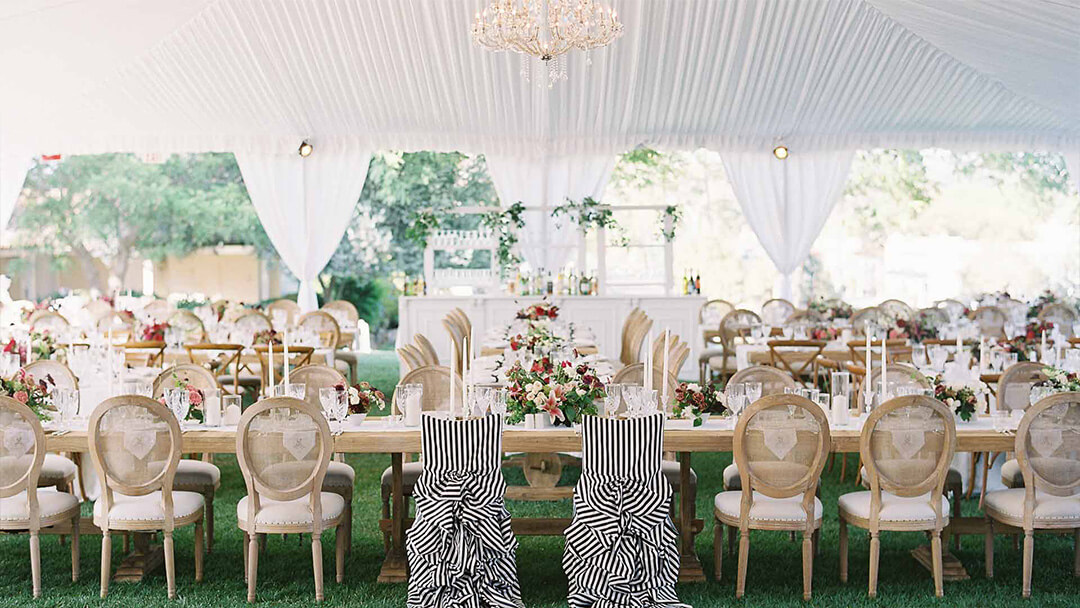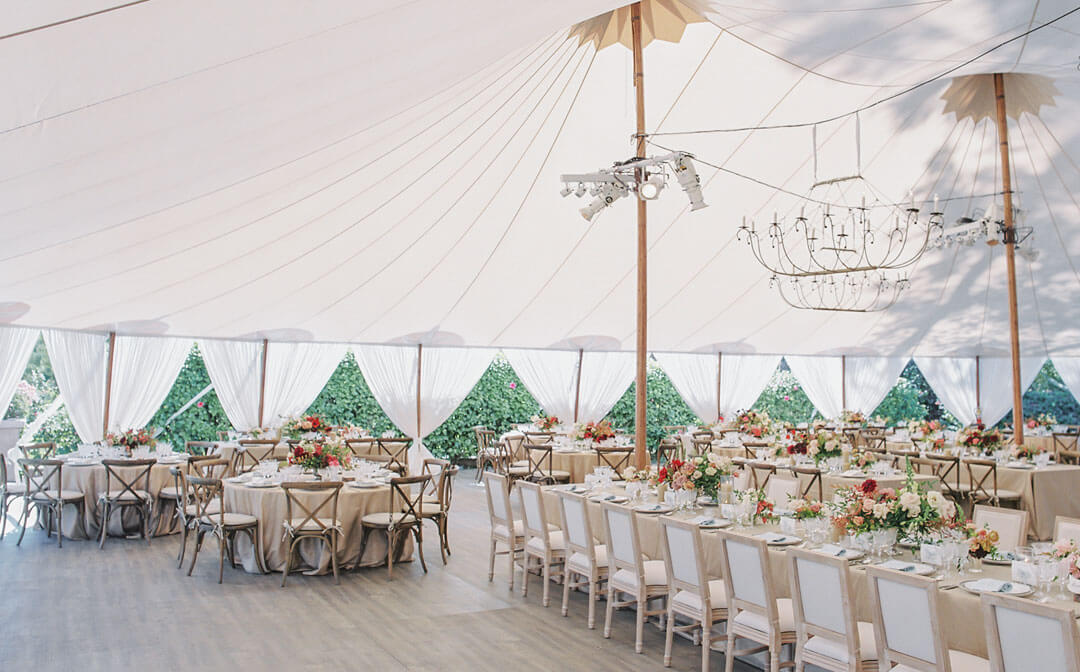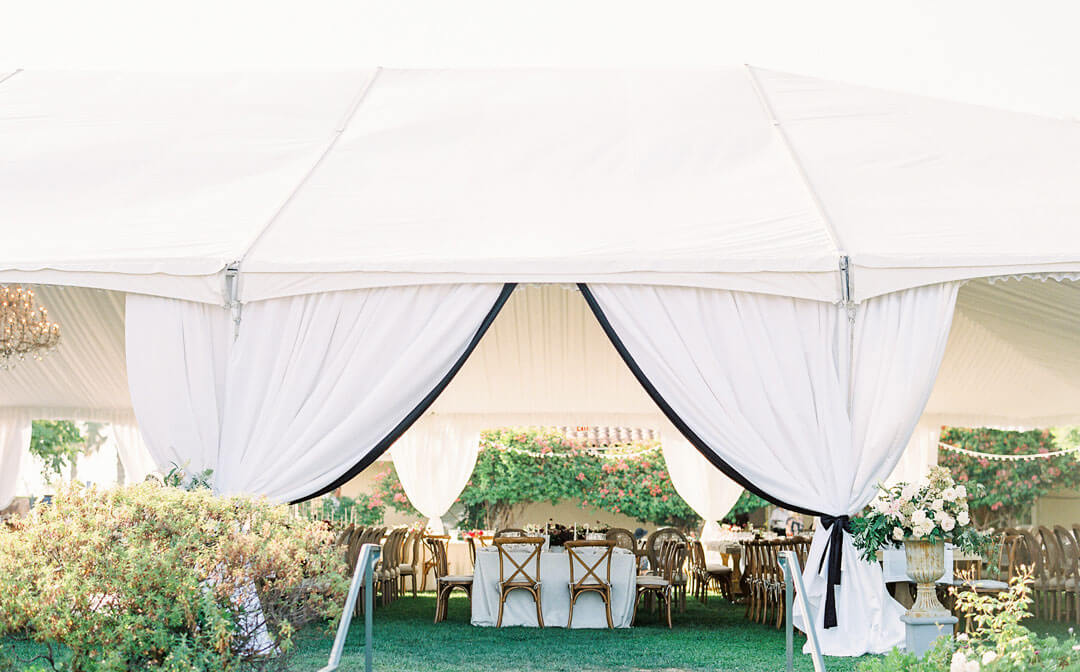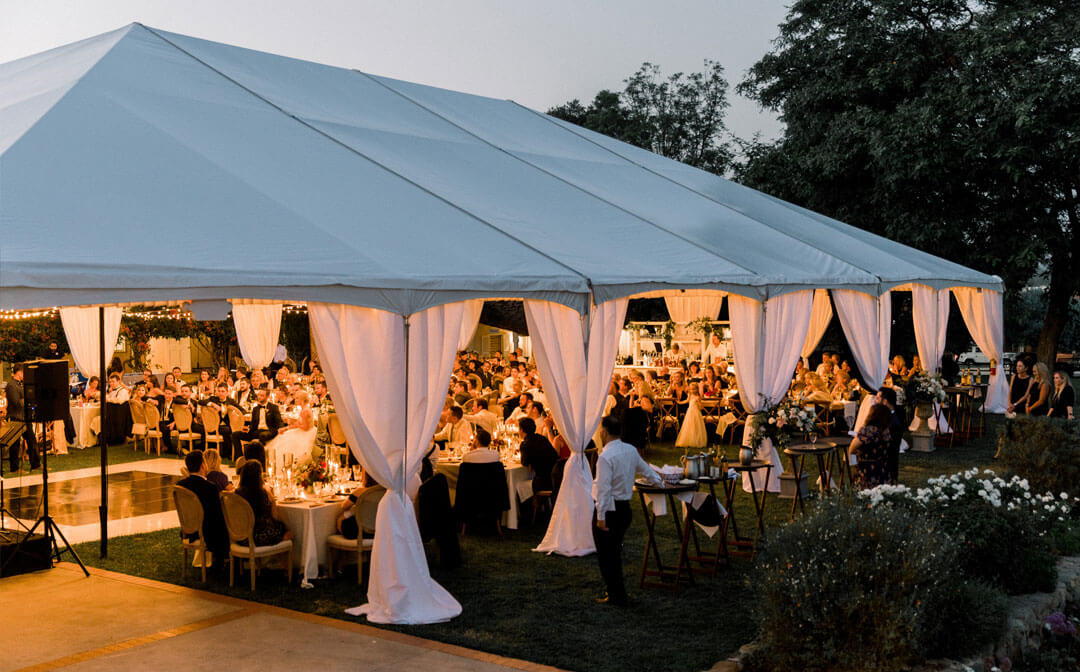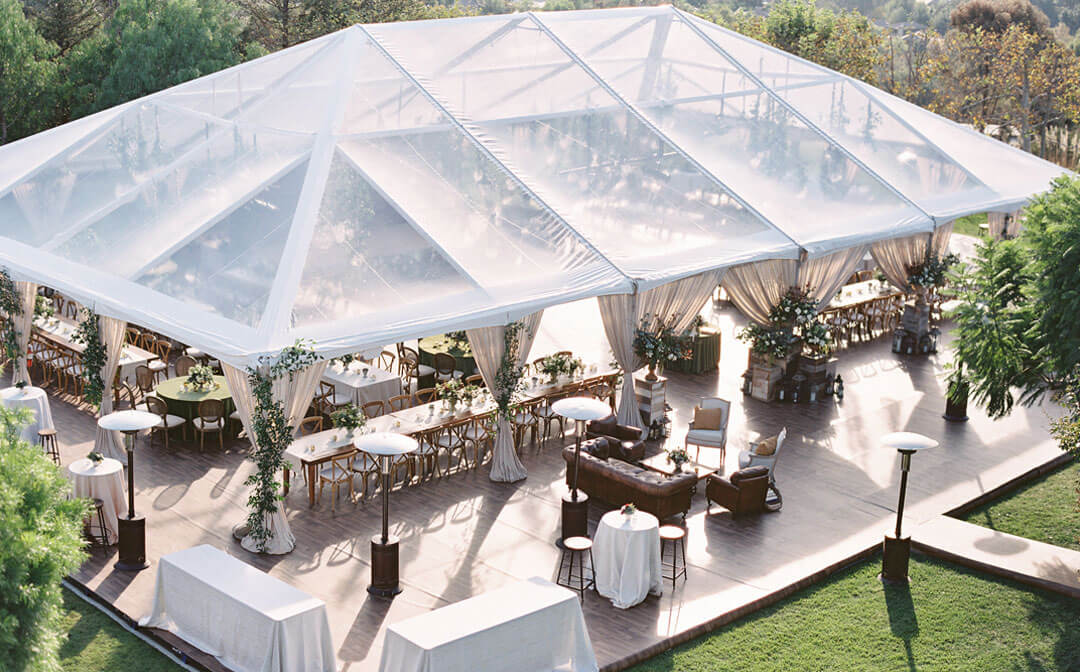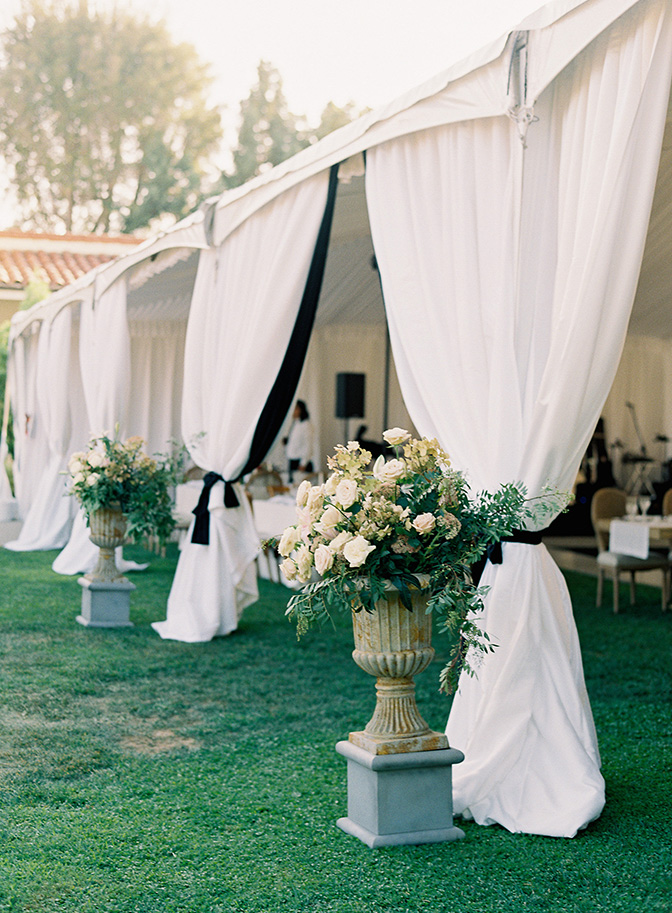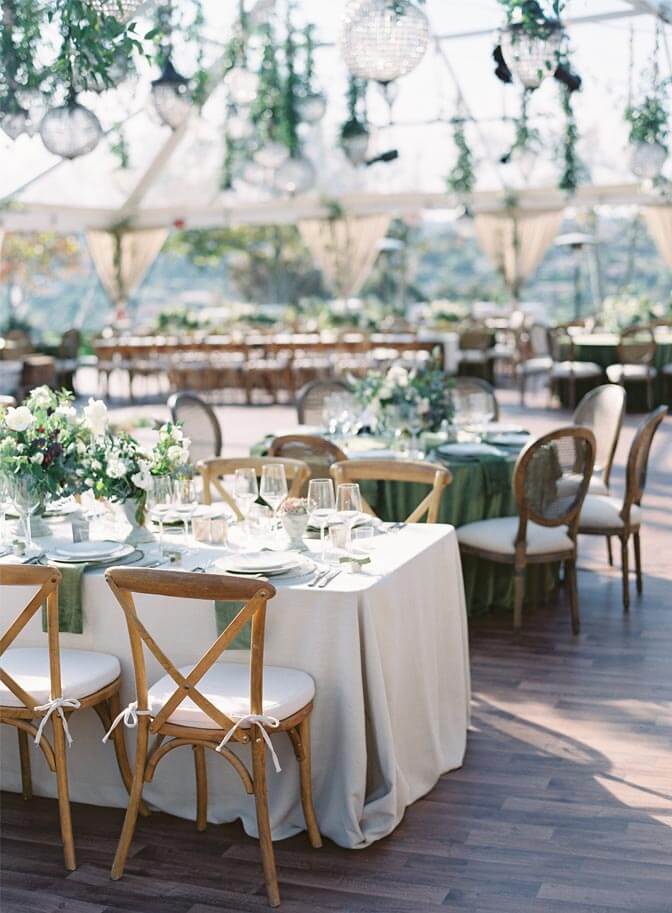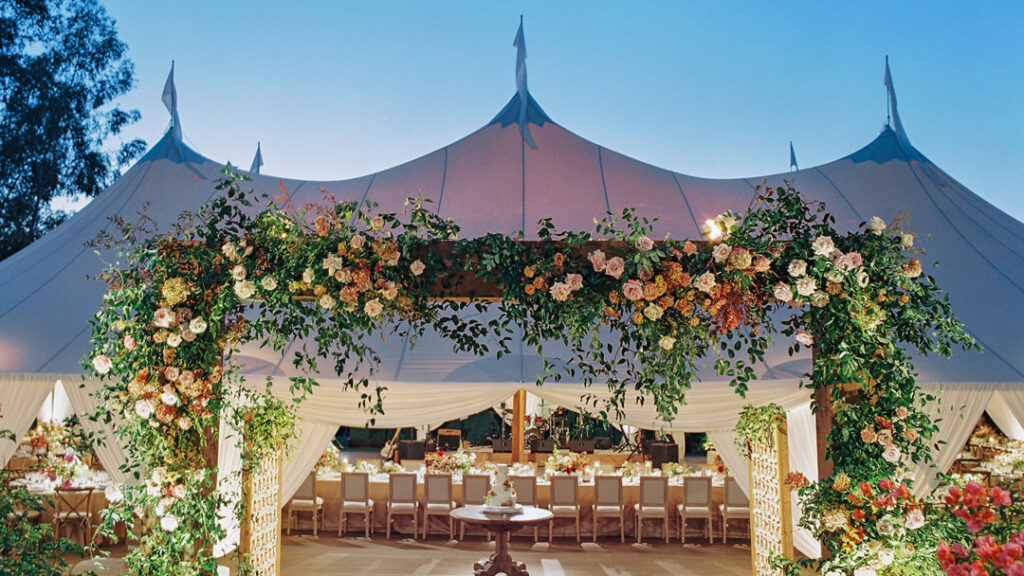Have you always dreamed of an elegant outdoor wedding overlooking a romantic vista but worry about shielding your guests from the elements? Or maybe your heart is set on a garden reception at your family home where there isn’t a structure readily available. A tented wedding might just be your answer.
At HauteFêtes, we adore tented weddings. They are a convenient way to have your celebration outside and virtually anywhere and, with the right design elements, can create an intimate, festive atmosphere.
Additionally, on a more practical level, tents protect from the outdoor elements–whether it be the sun, an unexpected rainshower, or summer bugs–all while providing a defined space for your event outside.
That being said, tented receptions are far more complicated than their non-tented counterparts and come with their own unique set of logistical and budgetary challenges.
Whatever your reason for planning a tented wedding, consider these six tips to help prepare you and ensure your celebration is nothing short of spectacular.
1. Plan for a Higher Budget
There are a multitude of ways a tent can transform your reception into a breathtaking and inviting wedding space. Like a blank canvas, tents allow your wedding vision to come to life without having to stay within the confines of what a venue typically offers.
While inspiring for the creative bride, tented weddings can be costly, especially if you’re already paying site fees and upgrading your decor and rentals. When planning a tented wedding, you’re responsible for all the costs of turning a raw space into an inviting atmosphere. This includes providing power, adequate lighting (both task and ambient), climate control, leg and ceiling drapings, and flooring for the space.
When budgeting for a tented reception, in addition to the main tent, you’ll likely also need a kitchen tent to ensure catering is as close to guests as possible. Remember to also factor in set-up and tear-down costs of all structures, which may include additional labor fees if you’re planning a more extensive build-out. Finally, there are also fire inspection fees to consider.
These expenses can add up quickly, adding several tens of thousands of dollars to the overall wedding cost. Therefore, prior to planning and designing a high-end tented wedding, work with your planner to figure out the actual costs, whether your budget is flexible, and how to prioritize accordingly.
If you aren’t sure how to manage your budget or prioritize your spending, consider a full-service wedding planner such as HauteFêtes. We help you protect your investment and make smart budget decisions that will enable you to have the tented wedding of your dreams.
2. Consider Your Guest Experience
It takes a lot of careful thought and planning to create high levels of ambiance, intimacy, and comfort in a tented wedding. Many of these considerations can affect the guest experience, too.
Flooring
Between your service staff and your guests, there is a ton of foot traffic into wedding tents–and that’s after the tent has been set up. Unless you’re working on concrete, your flooring will take quite a beating. Therefore, consider adding flooring to your tent as part of your overall design.
Flooring makes a huge difference that, while costly, may be worth the investment to take your wedding reception to the next level and ensure a positive guest experience. While grass is your cheapest option, fabricated flooring options range from carpet to sisal and laminate to wood. You’ll also need to factor in a subfloor to ensure the ground is level.
For winter weddings when temperatures dip or summer weddings in grassy areas, tent flooring keeps your space dry, cozy, and intimate and ensures your guests’ heels don’t sink into grass or dress or pant hems don’t get stained. With a fully floored tent, depending on the material used, you may also not need a dedicated dance floor.
Check the Temperature
While tents can be the perfect solution to protecting guests from the elements, without careful consideration, it can go the other way, too. Nothing is worse than seeing your breath inside a tent in the dead of winter or conversely, being trapped inside with no AC in the summer. Depending on your date and season, you may need to add air conditioners, fans, or heaters to your tent to keep your guests feeling comfortable.
Sound Check
It may seem trivial, but trust us, checking the noise levels inside your tent can be the difference between a flawless event and one where everyone leaves with ringing in their ears. Work with your band or DJ to ensure the music during dinner is at a level where guests can still talk while kicking it up on the dance floor to create an ambiance of celebration
3. Pick a Tent Model that Complements Your Vision
Wedding tents range in material, design, shape, size, and cost. When planning your tented wedding, work with your wedding designer and planner to ensure you pick a tent with the right aesthetics for your vision. Additionally, when choosing your tent shape and size, consider your guest count, venue space, and design elements.
Frame Tents with Hip Ends
Frame tents with hip ends slope in all four directions and are often used for wedding spaces. They come in a variety of sizes and can stand-up against high winds if needed. However, these designs may result in water runoff during inclement weather around the perimeter of the tent, making a subfloor and flooring a requirement.
Frame Tents with Gable Ends
Frame tents with gable ends–sometimes called “losberger” tents–have two flat, vertical ends, are easier to install, and eliminate water runoff. Similar to the hip end tents, gable tents provide solid protection from the elements. Frame tents also allow you to get creative by adding wood paneling to interior structure poles or experimenting with different drape techniques for a more modern look.
Sailcloth Tents
Sailcloth tents use a canvas fabric with peaks and inside wood tent poles that add a whimsical element to your space. They work well for summer events where heavy winds and rains are not likely to be an issue. Since they are installed with stakes and ratchet cables, they also require several more feet of staking space around the perimeter than a frame tent does.
Clear Tents
Without internal structural poles, clear tents offer a spacious atmosphere. They can be anchored in multiple ways that can hold up to inclement weather. With a see-through roof, a clear tent is wonderful at bringing views of the surrounding landscape into your event, but it also acts as a greenhouse, trapping warm air and making it a challenge for florists with wilt-able flowers and vendors working your set up.
There are a variety of considerations when choosing the right tent for your event. But, once you do, the fun of the design truly begins.
4. Know your Wedding Venue’s Tenting Rules
Just as not all wedding tents are created equal, neither are all wedding venues. If your heart is set on a tented reception, work with your full-service wedding planner to select a tent-friendly venue and know its rules before you book your tent.
What makes a venue “tent-friendly?” Here are a few questions to consider when conducting site visits:
Does the venue allow wedding tents? This is the first question to ask, as it will determine whether you consider a venue for your tented wedding or not. At this point in the conversation, it is also important to inquire about noise ordinances or any other rules a venue has regarding tented weddings. Quite often a venue will allow a tented reception, but all music will need to end by 10:00 pm and you’ll need to book a second space for an after-party–whether at the venue or elsewhere.
Does the venue have adequate space for the tent size you need? Work with your planner and tenting professional to ensure the venue can accommodate the size of tent needed for your guest count, as well as your wedding vendors and their set-up needs, a catering tent (if necessary), and a generator. Keep in mind the scale of the tent to its surroundings as well as accessibility, since some tents require a forklift to raise the center poles. Distance from surrounding buildings is an important consideration, as is a sufficient perimeter for staking, level ground, or feasibility of adding a raised subfloor.
Does the venue allow early set-up? Though this is not a deal-breaker, for planning purposes it is nice to know whether or not you can have additional tent set up days prior to your wedding, or whether your venue charges for those days. For the tent to be approved for use, a fire inspection is required the day before your wedding which is also when your planner will want to conduct a lighting test. This means most tents will need at least two days of set-up prior to the wedding day, as well as a day of breakdown the day after the wedding.
While designated wedding venues often provide a beautiful backdrop for your special day, at HauteFêtes, many of our couples have found private homes and estates to provide the flexibility required for tented weddings.
5. Incorporate Your Wedding Tent into Your Wedding Design
Your wedding tent is a big-ticket item and accordingly, should be considered central to your overall wedding design.
For example, for a more traditional wedding, use a frame tent with custom ceiling draping to create a ballroom feel; or for a garden or coastal style wedding, a sailcloth tent can add an effortless elegance. Consider also the style of light fixture: crystal chandeliers, wrought iron lanterns, or rattan pendants will each affect the look and feel of your tented wedding design.
Wood flooring can be used in a more rustic wedding or dressed up to provide a high-end backdrop. Sisal can be used to add texture to a coastal wedding. The possibilities are endless!
While the practicality of wedding tents are wonderful for the planning process, it is the design elements that we adore the most. To achieve a cohesive aesthetic that reflects your wedding vision and seamlessly integrates your wedding tent, consider partnering with a full-service wedding designer and planner such as HauteFêtes.
6. Don’t Wait Until the Last Minute to Book Your Tent
If you are planning a tented wedding, the best time to choose your wedding tent is sooner rather than later. Chances are if you’re planning a wedding outdoors and think rain is potentially an issue, so, too, are other couples. Rental companies have a limited supply of tent styles and sizes, so adequate planning will ensure you avoid late fees or lack of inventory.
A tented wedding is definitely a higher-end option for your reception but well worth the investment if it’s planned and executed correctly. A lot of time and planning goes into making a tented wedding spectacular; therefore, it is not something that should be thrown together at the last minute.
Plan a Spectacular Tented Wedding with HauteFêtes
At HauteFêtes, we are experts in planning the logistics and design for the best tented wedding experience on your special day. We will help you choose the perfect wedding venue and tent for your celebration, incorporating your vision into every aspect of design and styling.
Additionally, our years of experience will help you avoid costly mistakes and unexpected expenses that are all too common when planning a tented wedding. We handle all the logistics of producing tented wedding receptions, so you can focus on enjoying your wedding day, stress-free.
As your wedding partner, we ensure you will have a spectacular tented wedding experience that is tasteful and memorable for you and your guests. Please contact HauteFêtes today to begin planning your tented wedding of a lifetime.
